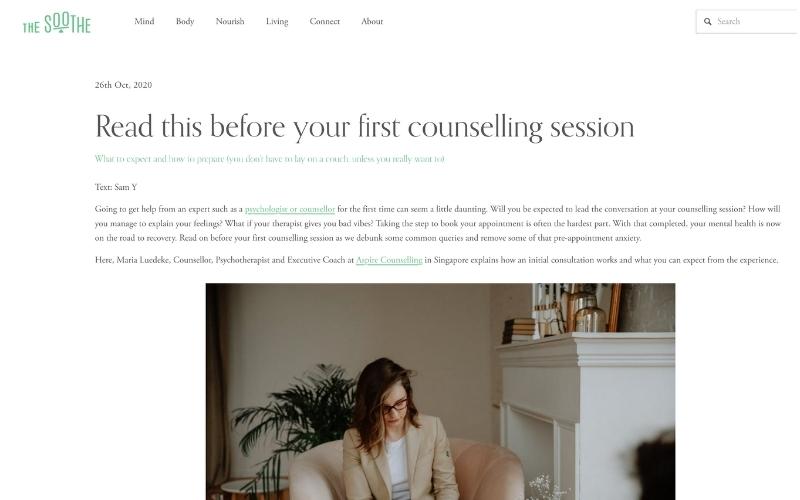What to expect and how to prepare (you don’t have to lay on a couch, unless you really want to)
Text: Sam Y
Going to get help from an expert such as a psychologist or counsellor for the first time can seem a little daunting. Will you be expected to lead the conversation at your counselling session? How will you manage to explain your feelings? What if your therapist gives you bad vibes? Taking the step to book your appointment is often the hardest part. With that completed, your mental health is now on the road to recovery. Read on before your first counselling session as we debunk some common queries and remove some of that pre-appointment anxiety.
Here, Maria Luedeke, Counsellor, Psychotherapist and Executive Coach at Aspire Counselling in Singapore explains how an initial consultation works and what you can expect from the experience.
The intake session
According to Maria, the first counselling session is called an ‘Intake Session’. This is a longer session, lasting about 80 to 90 minutes, in which your therapist will collect past physical, mental and relationship history to gain a holistic view of who you are,” Maria explains. Informed Consent is an important part of the intake process to take note of as well. “This is the document that explains the rules, obligations and boundaries of therapy. It reveals what the therapist can and cannot disclose under specific circumstances and the ethical restrictions and obligations. Always ask to see this before you start your session.” As the client, you should also be clear of the pricing, payment, cancellation and refund policies before starting therapy. This is also a great time to check with your therapist how often you should return to see them –– which can range from twice a week, once a week, once every other week, or once a month depending on the type of situation or issue you’re facing.
Don’t expect to have all the answers after the first session as it’s more of a chance for your therapist to get to know you and your medical history. However, a therapist’s duty is to ensure that each of their clients are safe and stable, hence if you’re dealing with self-harm, suicidal thoughts or are in imminent danger, their first priority would be to ensure your safety. For example, if you’re having debilitating panic attacks, they may give you some exercises or tools that you can use as coping strategies to work on in the short term.
Feeling anxious and thinking of taking along a friend or family member to therapy? That’s absolutely all right according to Maria. Just make sure that you’ve discussed this with your therapist ahead of time, and also take note that once you’ve settled into the session, your companion may be asked to wait for you outside so that the therapist can ensure that you aren’t under any external pressure or influence for an effective therapy session.
Judgement is withheld
If you struggle with an issue that you feel holds mental health stigma, or are just afraid you might not be able to deal with the emotions that arise during the session, you might feel worried that your counsellor or therapist will judge you during your sharing. If this is a fear for you, Maria is reassuring that there is nothing to be concerned about. “A therapist’s job is not to judge. In fact, part of our training is to learn how to suspend any judgement during therapy sessions.”
It’s also normal to cry during therapy (if this is a concern of yours). When emotions come bubbling up to the surface, it can be intimidating, but think of therapy as a safe place to be vulnerable. Therapists will never force you to answer any questions you’re uncomfortable with as well, unless they suspect suicide ideation or that you may be in danger of harming yourself or someone else. “They may then say, I really need to know the answer to this question for your safety and protection,” says Maria.
You also won’t have to worry about awkward silences, in fact, silence might be exactly what you need for a truly reflective session. “Great therapists are really comfortable with silence, it’s often after a lot of silence that a client is able to be reflective and thoughtful,” Maria reveals.
Honesty is key
Building a good rapport with your therapist is paramount to successful therapy. A great way to build a strong relationship fast is by arriving at your first session with honesty and an open mind. “Being open in therapy is important if you want to make progress, and will help you process and create the change necessary for therapeutic goals,” says Maria. Research has shown that this is the single most important factor in determining the efficacy of therapy outcomes. So, don’t be shy … speak out.
Do your homework
“Clients that simply come to sessions and don’t do any work in between rarely make the sort of progress they desire,” Maria cautions. Spending time before and after sessions reflecting on what was discussed can help you reach your mental health goals sooner. Also, they’re going to want to hear about your progress when you next see them.
Importantly, if you happen to dislike your therapist after the first two to three sessions, you are not obliged to keep seeing them. “It’s important you feel a connection to the therapist, and you don’t have to return if you don’t feel it’s the right fit. But that should not discourage you from continuing to seek out therapy,” says Maria. However, just ensure that you’ve checked the terms and conditions of your package with them, as you may not be able to get a refund.
Maria advises that before going to see any mental health professional it’s important to check that they’re qualified and trained in the area of speciality you are seeking. Check out our feature on the differences between counsellors, psychologists, psychiatrists and life coaches to get a better understanding of what these experts can offer you.
If you suspect that you are facing mental-health related problems, you are strongly encouraged to seek professional help. In the case of an emergency, the SOS (Samaritans of Singapore) operate a 24-hour helpline on 1800 221 4444.





